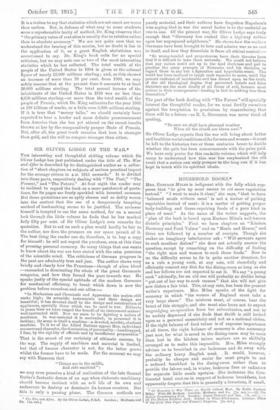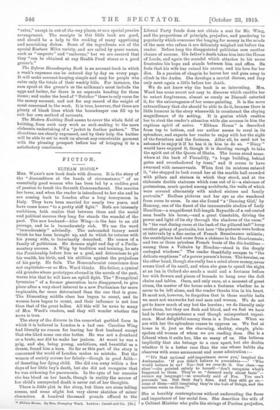HOUSEHOLD BOOKS.*
MRS. EUSTACE MILES is indignant with the folly which sup- poses that "to give up meat means to eat more vegetables instead." " I want to make it clear," she says, " that to have balanced meals without meat' is not a matter of putting vegetables instead of meat : it is a matter of getting proper body-building and tissue-repairing foods of a pure kind in place of meat." As the name of the writer suggests, the "plan of the book is based upon Eustaco Miler's well-known dietetic principles." First we have chapters on "Kitchen Economy and Food -Values" and on "Meals and Menus," and these are followed by a number of receipts. Though she makes an imaginary interlocutor ask " Will servants agree to cook meatless dishes?" she does not actually answer the question, except by remarking on the difficulty of finding "the right men and women to cook these foods." Now to ns the difficulty seems to lie in quite another direction, for as a rule a young cook, at any rate, will cheerfully and efficiently concoct any dish for the dining-room so long as she and her fellows are not expected to eat it. We say " a young cook" advisedly, for an old one will probably so dislike being "put out of her way to cook messes" that she will not give new dishes a fair trial. This, at any rate, has been the present writer's experience. Mrs. Miles speaks of the fight for economy in which " the women of England must take a very large share." The mistress must, of course, bear the brunt of this struggle, and she must also learn not to expect ungrudging co-operation from her subordinate; and not to be unduly depressed if she finds that thrift is still looked upon as a personal eccentricity and not as a national virtue. If the right balance of food values is of supreme importance at all times, the right balance of economy is also necessary just now, for what is saved in the dining-room may be more than lost in the kitchen unless matters are so skilfully arranged as to make this impossible. Mrs. Miles strongly advises us to breakfast in our bedrooms and do away with the ordinary heavy English meal. It would, however, probably be cheaper and easier for most people to eat a reduced breakfast in the dining-room rather than to provide the labour and, in winter, bedroom fires or radiators for separate little meals upstairs. She instances the Con- tinental hotel oust= in support of bedroom breakfasts, but apparently forgets that this is generally a luxurious, if small, • (1) &ammo; in War Time; or, Health without Meat. By Bailie Eustaoe Miles. With 140 Roolpee, London: Methuen and Co. [la. net.]—(2) The Itaferoo llousokoeving Book. London : James Truseott and Son. [le. not.)-- (3) The Modern Knitting Book. Edited by Flora Kholnann, London: Olase of the Girls' Own Paper and Woman's Mauazino. [1s. not] "extra," except in out-of-the-way places, or as a special pension arrangement. The receipts in this little book are good, and should be a help to the cooking of many appetizing and nourishing dishes. Some of the ingredients arc of the special Eustaco Miles variety, and are called by queer names, such as " emprote" and "embovno," but we are assured that they "can be obtained at any Health Food stores or a good grocer's."
The Referee Housekeeping Book is an account-book in which a week's expenses can be entered day by day on every page. It will make account-keeping simple and easy for people who enter only the totals of their weekly bills. For instance, the sum spent at the grocer's or the milkman's must include the eggs and butter, for there is no separate heading for these items ; and under the bead of "Butcher " there is only room for the money account, and not for any record of the weight of meat consumed in the week. It is true, however, that there are plenty of blank lines which the housekeeper can fill up to suit her own method of accounts.
The Modern Knitting Book seems to cover the whole field of knitting, from such easy work as sock-making to the more elaborate undertaking of a "jacket in feather pattern." The directions are clearly expressed, and by their help the knitter will be able to set to work on almost any conceivable garment with the pleasing prospect before her of bringing it to a satisfactory conclusion.







































 Previous page
Previous page